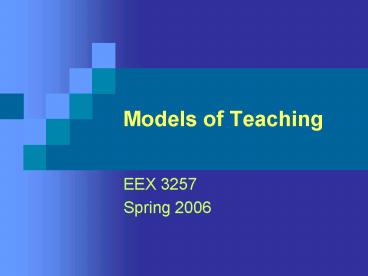Models of Teaching - PowerPoint PPT Presentation
Title:
Models of Teaching
Description:
Survey 10 other children about the bikes they ride. Chart the results. Demonstrate the correct way to cross the street on your bike. Applying ... – PowerPoint PPT presentation
Number of Views:35
Avg rating:3.0/5.0
Title: Models of Teaching
1
Models of Teaching
- EEX 3257
- Spring 2006
2
Motivation to Learn
- Teacher Characteristics
- A safe and orderly classroom
- Instructional factors
3
INTASC Principles(Interstate New Teacher
Assessment and Support Consortium)
- Knowledge of subject
- Learning and human development
- Adapting instruction
- Strategies
- Motivation and management
- Communication skills
- Planning
- Assessment
- Commitment
- Partnership
4
Teaching for Understanding
- Identify learning objectives
- Select teaching strategies
- Provide examples and representations
- Encourage active student involvement on learning
- Guide students
- Continually monitor evidence of learning
5
What factors influence choice of strategy?
- Teacher
- Student
- Content
6
Strategies vs Models
- Strategies
- Questioning
- Organizing lessons
- Providing feedback
- Ending lessons with review and closure
- Models
- Designed for specific forms of content and to
develop critical-thinking abilities - Include a series of specific steps
- Grounded in learning theory
- Supported by motivation theory
7
Theories of Learning
- Behavioral theory
- Cognitive theory
8
Behavioral Theory
- Learning is
- Change in behavior
- Result of experience
- Learning depends upon
- Reinforcement
- Punishment
9
Cognitive Theory
- Theories of learning primarily concerned with
- Perception
- Problem solving
- Information processing
- Understanding
- Seeks to understand
- . The nature of information
- How information is organized and acquired
- How information can be recalled and analyzed or
modified
10
Blooms Taxonomy Original and Revised
- Evaluation
- Synthesis
- Analysis
- Application
- Comprehension
- Knowledge
- Creating
- Evaluating
- Analyzing
- Applying
- Understanding
- Remembering
(Based on Pohl, 2000, Learning to Think, Thinking
to Learn, p. 8)
11
Sample Unit Travel
12
Blooms Practice
- Choose a lesson topic
- Using the handouts, develop an objective or
activity and questions related to your lesson
topic for each level of Blooms taxonomy































